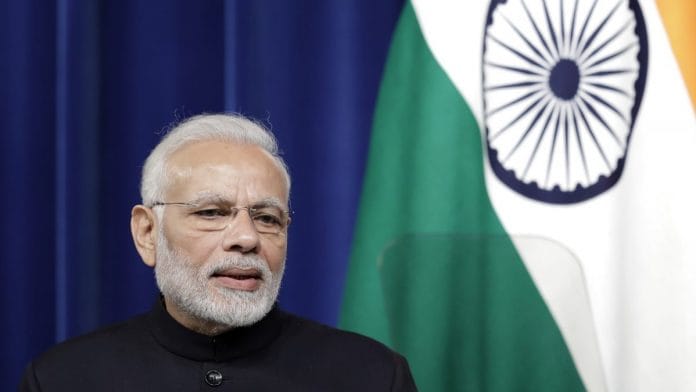New Delhi: As India officially joined the space arms race Wednesday with its anti-satellite missile test under operation Mission Shakti, New Delhi seems set to pursue the technology in future without fear of sanctions as threats from space-based long range missiles proliferate.
“We have to keep pace with technology so that we can positively transform the lives of our people. All Indians must feel secure and have the confidence to meet the challenges of the future,” Prime Minister Narendra Modi said as he announced the successful completion of Mission Shakti under which an anti-satellite missile, or A-SAT, shot down a live satellite at a distance of 300 km.
Although Modi made the announcement with utmost fervour, he was quick to add that this was not targeted against any country. But it was clear from his speech that after this exercise India will continue to develop this technology that is aimed at kinetic kill.
S.L. Narasimhan, member, National Security Advisory Board (NSAB), believes that as India’s space programme develops, the country will continue to build its space deterrence.
“This is a kinetic energy kind of thing and the programme will go on and it will continue to mature eventually,” said Narasimhan.
He added that it is imperative for India to safeguard its 49 satellites.
Also read: A-SAT launch is great, the timing not so much
Credible deterrence
According to a note issued by the Ministry of External Affairs (MEA) after the test, India will continue to remain focused on being “alert” to threats emanating from emerging technologies, making it clear that New Delhi will continue to pursue the programme.
“The test is not directed against any country. India’s space capabilities do not threaten any country and nor are they directed against anyone. At the same time, the government is committed to ensuring the country’s national security interests and is alert to threats from emerging technologies,” said the note.
“The capability achieved through the Anti-Satellite missile test provides credible deterrence against threats to our growing space-based assets from long range missiles, and proliferation in the types and numbers of missiles,” it added.
India needs to develop the programme and build its own indigenous space weapons not with the purpose of weaponising the space but for deterrence, said S.D. Muni of New Delhi-based think-tank Institute for Defence Studies and Analyses (IDSA).
“We see the No First Placement of weapons in outer space as only an interim step and not a substitute for concluding substantive legal measures to ensure the prevention of an arms race in outer space, which should continue to be a priority for the international community,” the MEA note added.
India continues to support the substantive consideration of the issue of Prevention of an Arms Race in Outer Space (PAROS) in the Conference on Disarmament where it has been on the agenda since 1982.
Also read: BJP leaders congratulate PM Modi for India’s A-SAT success
International treaties and threat of sanctions
As the ruling BJP trumpets the success of Mission Shakti, questions have been raised by some of the opposition parties on whether this will invite international sanctions.
Defence expert and author Bharat Karnad said it is important that India does not lag behind as the arms race in outer space becomes rapid.
“There is no question of sanction here because there is simply nothing on international regime on this. There is always a race going on in outer space and those who will fall behind will suffer,” said Karnad.
“This is a straightforward military term — ‘civil utility’. We will have to think of our own national security and we need to build deterrence,” said Karnad, a professor at the New Delhi-based Centre for Policy Research.
The principal international treaty on space is the 1967 Outer Space Treaty. India is a signatory to this treaty, and ratified it in 1982.
According to the MEA, India is a party to all major international treaties relating to outer space.
India already implements a number of Transparency and Confidence Building Measures (TCBMs) — including registering space objects with the UN, pre-launch notifications, measures in harmony with the UN Space Mitigation Guidelines, participation in Inter Agency Space Debris Coordination activities, undertaking Space Object Proximity Awareness and Collision Avoidance analysis and numerous international cooperation activities.
India has also been participating in all sessions of the UN Committee on the Peaceful Uses of Outer Space.
The ministry added that India had supported UNGA resolution 69/32 on No First Placement of Weapons on Outer Space in 2014.






